Q&A Session with the Cast and Executive Producer of THE FIRM (TCA 2012 Winter Press Tour)
Jacob Jester - January 7, 2012
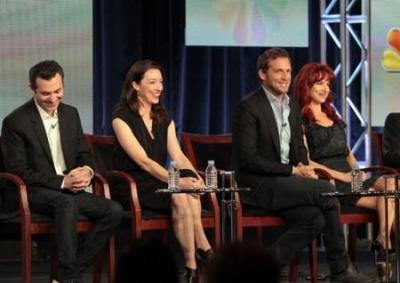
NBC's new legal drama THE FIRM, based on John Grisham's novel of the same name, rejoins the story of Mitch and Abby McDeere 10 years after the events that drove them into witness protection as the couple reclaim their former identities -- only to find that the dangers from their past are far from finished. The series kicks off this coming Sunday, January 8th with a two-hour premiere, and switches to its regular timeslot on 8pm on Thursdays.
Stars Josh Lucas, Molly Parker, Callum Keith Richie, and Juliette Lewis, and executive producer Lukas Reiter answered questions about the new series, as part of yesterday's panel at the Television Critics Association Winter Press Tour.
|
|
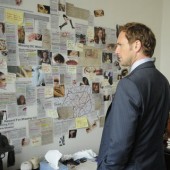 |
Question (for Lukas Reiter): Was it always necessary that Mitch just has the most spectacularly bad luck on Earth with selecting law firms? [laughter] LUKAS REITER: You know, it's funny you say that because, from my very first conversation with John Grisham about this, that was front and center in what we talked about. We said, "So every time Mitch McDeere walks into a law firm, he's walking into a front for a corrupt organization?" So from the beginning, guys, I really promise, we really tried to take to heart that thought and make sure that we were keeping Mitch as smart and resourceful and intelligent about those issues as he could be. We did need to have Mitch encountering certain challenges again, but we are trying very hard to be smart about it. |
|
|
|
||
|
|
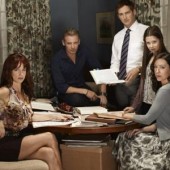 |
Question (for Lukas Reiter): Did you want people to make a strong association with the book and the movie? Or was there a stronger desire to have the show stand on its own and just have "The Firm" name? LUKAS REITER: The goal was always both. It was always to create a show for those that love the story, love the novel, love the movie. I think that "THE FIRM," both the novel and the film, are classic legal stories. The goal was absolutely to create something that those who love that story would be able to recognize and find things that they appreciated about the way we were continuing the story, but also to make sure that we were creating something that those who had no familiarity with it would be able to get the back story that they need quickly, and really understand what the back story was and get swept away in a brand new story. |
|
|
|
||
|
|
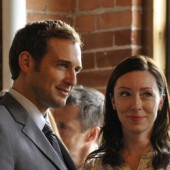 |
Question (for Lukas Reiter): Did you go to Grisham? Or how did this come about? LUKAS REITER: I've been writing legal drama for most of my career. So I spend more time than the average human being does thinking about the great legal stories of our time, and "The Firm" was always at the top of my list. So I started wondering why didn't John Grisham ever continue the story? Why didn't he tell us more about Mitch and Abby McDeere? So I set up a meeting with Grisham's representative in New York, went there and talked to him about the idea to see if John would be interested. He generously said he would pass it on, and just a few days later, I got a call to say that John was interested enough to want to know more. And right from the beginning, he said, "You know, this is an interesting way in. I'd love to talk to you about it," and we really started the collaborative conversation about how to do it. He was on board from the beginning. |
|
|
|
||
|
|
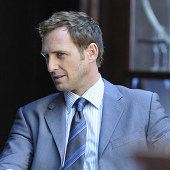 |
Question (for Josh Lucas): For some people this will be the third incarnation of these characters. They saw them one way in the book, one way in the movie. So how did you all approach these characters? Are there built-in expectations that you feel? JOSH LUCAS: Honestly, I felt like one of my responsibilities is to pay homage to Tom Cruise's performance, not necessarily to take over in any way. Tom Cruise does this beautiful thing in the movie, not just with the paranoia and the ambition and the drive that he obviously exhibits throughout with the character, but little details that I hope one day to actually incorporate into the series. |
|
|
Otherwise, I felt really like this is 10 years later, and these are very different people. Honestly, they're much more damaged. At the beginning of the movie and the book, there's a sense of naïveté and drive and ambition that I think is very different now. It's very much survival and fear and paranoia, and the lifestyle that I think happens after 10 years of being on the run is so damaging. |
||
|
|
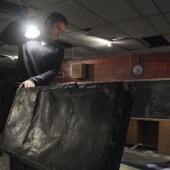 |
Question (for Lukas Reiter): A question about the structure. We start with this very dramatic event of a guy jumping out the window and then flash back. So is the entire season going to be leading back up to the guy jumping out of the window, or is that going to happen and then we move beyond that? LUKAS REITER: We do fracture time in the series. So we begin each episode in the future, right? And then we come back to see how it is that he got there. The goal, though, is that we will not expect the audience, I can tell you, to wait a season to understand the events that they're seeing in the pilot. By the sixth and seventh episode, many of the questions that you're seeing in the pilot are already being answered. We're already catching up to some of the drama that you see in the early part of the show. So as opposed to creating one big jump for the season, there are smaller jumps throughout. |
|
|
|
||
|
|
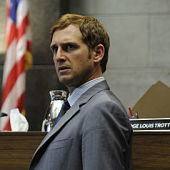 |
Question (for Lukas Reiter): How much is just "case of the week"? How much is "the firm is nefarious and the mob wants to kill Mitch McDeere"? LUKAS REITER: It's hard to give it a percentage. I'm not sure. I think the story dictates, each episode, how it gets weighted. But the goal was certainly in every episode to have a stand-alone case that has a beginning, middle, and end for those people who are joining us on any given episode to get a dramatically satisfying experience and for that thread to be feathered through. |
|
|
|
||
|
|
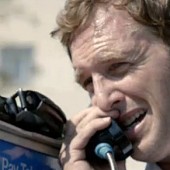 |
Question (for Josh Lucas): TV's got a lot of anti-heroes. You've got Don Cheadle in HOUSE OF LIES as the latest. I'm wondering what the draw is of playing an old-school hero and if you have any favorite TV heroes from the past? JOSH LUCAS: I've been very surprised how often, particularly in press that I did more internationally, they kept asking about the presence of Occupy Wall Street and whether or not this show responded to that in any way. And the truth of the matter is Mitch McDeere is not a man who would be probably camped out, but he would be their lawyer. This is a guy who is always fighting against the system. |
|
|
Now, is he a typical or a straightforward hero? I personally have worked with and like very much Anthony Edwards, who has a similar kind of character in ER. He's a very, very good man, very much trying to do the right thing all the time. And yet the reality with Mitch McDeere is that that's also why he is so flawed, because he is so driven to do the right thing that he's willing to make terrible mistakes, including putting his family at risk to do so. So hopefully that is what you all start seeing as the show develops. |
||
|
|
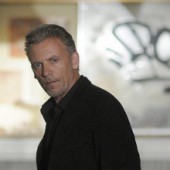 |
Question for Callum Keith Rennie): This is yet another gritty role for you in yet another gritty show after BATTLESTAR GALACTICA. How challenging is it for you as an actor to bring something new to this? CALLUM KEITH RENNIE: I love the character of Ray because he's someone seeking redemption for something he did in the past. So it's got a lot of colors in it. I get to play the gritty, hard man who also is trying to serve a higher purpose. So that's different for me, and it appeals to me. When I read it, it was awesome. |
|
|
|
||
|
|
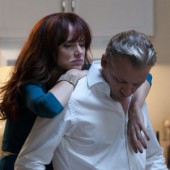 |
Question (for Juliette Lewis): When the book and the movie end, we see the beginning of [your characters'] relationship. Can you talk about where your relationship stands now between these characters and what they're like? JULIETTE LEWIS: He won't marry me, no matter what. I think I'm really good in the sack as Tammy. [Laughter] Just kidding.
So in episodes to come, you'll see their friction, that they work together. They both do things their own way. I like to think there's a playful competitiveness underneath their work. And you'll see, no matter what, they're never going to leave each other's side. And you'll wonder later if they'll get more involved. You'll sort of do the dance with them: will they or won't they? Will they get married? Will they move into a proper house? |
|
|
|
||
|
|
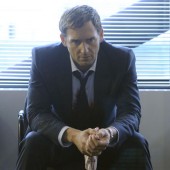 |
Question (for Josh Lucas): Josh. You're a movie star. What made you want to do this show? What attracted you? Why TV? Why now? JOSH LUCAS: The reality is that, look, everyone is moving to television right now. Television has some of the best writing that's going on. You look at Martin Scorsese, Steven Spielberg. And I felt that the pilot was such a page-turner. It was thrilling television and I hadn't seen a John Grisham thriller yet on TV. I know what 24 was, but it was the idea of this hybrid of making a well-written, thrilling series that dealt with the law. |
|
|
To be honest with you, from a more detailed personal standpoint, I had been involved in a very serious trial as a jury member last year including putting a man away for life, and it fascinated me. It deeply fascinated me. It was a very scary trial. He recognized me immediately and yet it was not grounds for my dismissal. I then spent a lot of time in preparing for THE LINCOLN LAWYER going to courtrooms after that because I was so fascinated by the drama of it, and I felt like if someone could really capture this and also make a thrilling John Grisham element out of it as well, it could be really interesting. |
||
|
|
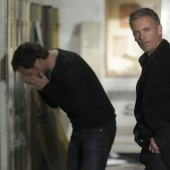 |
Question (for Josh Lucas): How are you finding the pace of TV compared to movies? Which do you like better? JOSH LUCAS: In the last 10 years of making movies, I've been very lucky to work fairly consistently. I've done more material in the last 10 months than I will have done in the last 10 years. Acting in films is the NFL. Acting in television is arena football. And I mean that only in the speed. The speed of arena football is tremendously fast. It's a remarkably different pace. |
|
|
The big thing I see these days, the movie industry is failing at a pretty severe level, and unless it's a massive blockbuster, the companies are not out there to support the visions, no matter what is made, no matter how good it is. And that's not true in television right now. Television is a platform for people to get out some absolutely fascinating work, you know. And I think, to me, that's why we all did it, was for the hopes that we'd do work that is hopefully seen and enjoyed. |
||
|
|
